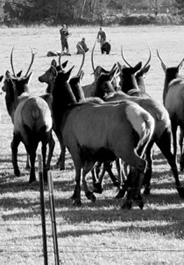The Humane Society of the United States launched its anti-poaching rewards program about two years ago -- providing cash rewards to people who give information that leads to the arrest and conviction of people involved in the illegal killing of wildlife. It's modeled after our successful rewards programs for organized animal fighting and other forms of malicious cruelty. It's a program that state fish and wildlife agencies, hunters, and animal protection advocates can agree works in everyone's collective interests.
Unfortunately, our rewards program addresses just a subset of the unethical conduct that occurs under the banner of the taking of wildlife. There are many hunters who may act within the limits of the law, but they violate the written and unwritten codes of conduct that sportsmen are asked to observe.
Last week, Tahlia Ganser reported in The Seattle Times on an appalling incident. A large group of bow hunters pinned a herd of elk in a pasture and repeatedly shot arrows into the group, killing seven animals and wounding several more. It was sickening to watch hunters walk up to trapped animals and fill them full of arrows and then to witness the animals slowly bleeding to death as the hunters casually stood by and did not use more lethal weapons to dispatch the grievously wounded animals.
The local community was rightly outraged. Though they claimed the conduct was not illegal, state Department of Fish and Wildlife officials responded by issuing an emergency closure of the bow hunting season and stated to the press that the hunters "lacked discretion."
Last October, as reported by the Los Angeles Times' Pete Thomas, a dozen wildlife watchers stood in awe as they witnessed a grizzly bear swimming and fishing near Alaska's Kenai River. Their magical experience was shattered, however, when two hunters arrived and shot the bear five times as he crossed the road and ran up a hill into legal hunting territory.
I have written before of abuses by hunters and the organizations that defend any behavior that is remotely related to "hunting." The NRA works to defend poachers, the U.S. Sportsmen's Alliance rises in angry defense of killing and importing threatened polar bears from Canada, the Safari Club International argues in federal court that they should be allowed to kill endangered species trapped within fences. Where is the leadership in the hunting community? They trade on the reputations of Teddy Roosevelt and Aldo Leopold, but they do not honor their example. Who is there within the hunting fraternity to condemn the individuals whose behavior is at odds with the norms of hunting ethics -- eating what you kill, giving animals a reasonable chance to escape, not engaging in commercial killing, trying to deliver a quick and relatively painless death, and strict adherence to wildlife laws?
It should not be up just to The HSUS to call hunters on the carpet for grossly unethical behavior. Usually though, when there is reprehensible conduct that comes to light, there is either deafening silence from hunting organizations and outdoor writers, or even a knee-jerk defense of the conduct in question. Hunter education courses conducted by the states should do more than provide perfunctory attention to these issues. I've been waiting 20 years for the responsible voices to emerge within the hunting community, and while they are present, they are small in number and, in many cases, marginalized by the more politically connected and organized hunting interests who dominate the dialogue. The carnage in Washington state provides yet another reminder to us all.
This post originally appeared on Pacelle's blog, A Humane Nation.

